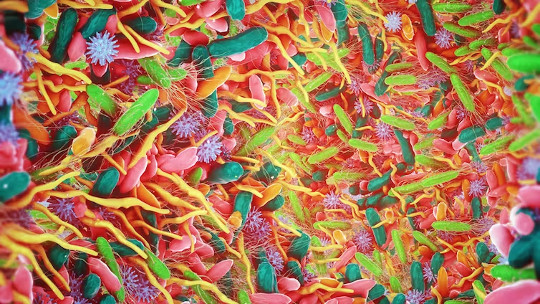
The gut microbiome may play a role in regulating the body’s appetite, cognition and immune responses. nopparit/iStock via Getty Images Plus
Diet-related chronic diseases have reached a critical juncture in the U.S.
Nearly half the population has prediabetes or diabetes. Over 40% are overweight or obese. One in nine people over the age of 65 has Alzheimer’s disease, the development of which researchers are exploring the potential role of diet. Poor diet is also linked to poor mental health, cardiovascular disease and cancer. It was responsible for nearly 1 in 5 deaths in the U.S. and accounted for over US$140 billion in U.S. health care spending in 2016.
Though American waists are getting bigger, research is showing that the gut microbiome – the bacteria living in our digestive tracts – and the energy-producing compartments of cells, the mitochondria, remain hungry for nutrients missing in the American diet.
I am a physician scientist and gastroenterologist who has spent over 20 years studying how food can affect the gut microbiome and whole body health. The ultraprocessed food that makes up an increasing part the American diet has removed vital nutrients from food. Adding those nutrients back may be important for health in part by feeding the microbiome and mitochondria that turn food into fuel.
Your health is what you eat
Research has consistently shown that the Mediterranean diet and other whole food diets are associated with better health and longer lives, and ultraprocessed foods and drinks like soda, chips and fast food, among others, are linked with poor health outcomes such as diabetes, cardiovascular disease, cancer and other diseases.
Get The Latest By Email
But improving the diet of an individual, let alone a population, is challenging. Whole foods are sometimes less convenient and less tasty for modern lifestyles and preferences. Furthermore, food processing can be beneficial by preventing spoilage and extending shelf life. Whole grain processing in particular extends shelf life by removing the germ and bran that otherwise rapidly spoil. Long-term storage of affordable calories has helped address food insecurity, a primary challenge in public health.
What you eat changes the composition of your gut microbiome.
Much of the public health conversation around diet has focused on what to avoid: added sugars and refined carbs, some fats, salt and additives. But modern food processing, while increasing the concentration of some nutrients, has removed other key nutrients, producing potential long-term health costs. Equally important is what to add back into diets: fibers, phytonutrients, micronutrients, missing fats and fermented foods.
Only 5% of the U.S. population gets sufficient fiber, a prebiotic nutrient linked to metabolic, immune and neurologic health. Americans are likely also deficient in phytonutrients, potassium and certain healthy fats linked to lower rates of cardiovascular disease and cancer.
Fermentation is nature’s version of processing, creating foods with natural preservatives, flavors and vitamins. Recent research suggests fermented foods can improve gut microbiome diversity and dampen systemic inflammation.
Figuring out which bioactive nutrients contribute to disease can help both individuals and institutions develop diets and foods that are personalized to different health conditions, economic constraints and taste preferences. It can also help maximize nutrients in a way that is convenient, affordable and familiar to the modern palate.
Of microbiomes and mitochondria
Understanding how nutrients affect the gut microbiome and mitochondria could help determine which ingredients to add to the diet and which to temper.
In your lower gut, bacteria transform undigested bioactive nutrients into biochemical signals that stimulate gut hormones to slow down digestion. These signals also regulate the immune system, controlling how much of the body’s energy goes toward inflammation and fighting infection, and cognition, influencing appetite and even mood.
A number of factors are involved in aging.
The microbiome’s biochemical signals also regulate the growth and function of energy-producing mitochondria across many cell types, including those in fat, muscles, heart and the brain. When these cues are missing in ultraprocessed diets, mitochondria function less well, and their dysregulation has been linked to obesity, diabetes, Alzheimer’s disease, mood disorders and cancer. A better understanding of how diet could improve the function of the microbiome-mitochondria axis could help provide a way to reduce the burden of chronic disease.
The Greek physician Hippocrates, regarded as the father of medicine, supposedly once said “Let food be thy medicine,” and a growing body research suggests that, yes, food can be medicine. I believe that shining a light on the connection between diet, health and the microbiome and mitochondria could help societies reach a bright future in which unhealthy aging isn’t an inevitability of growing older.![]()
About The Author
Christopher Damman, Associate Professor of Gastroenterology, University of Washington
This article is republished from The Conversation under a Creative Commons license. Read the original article.
books_diet







